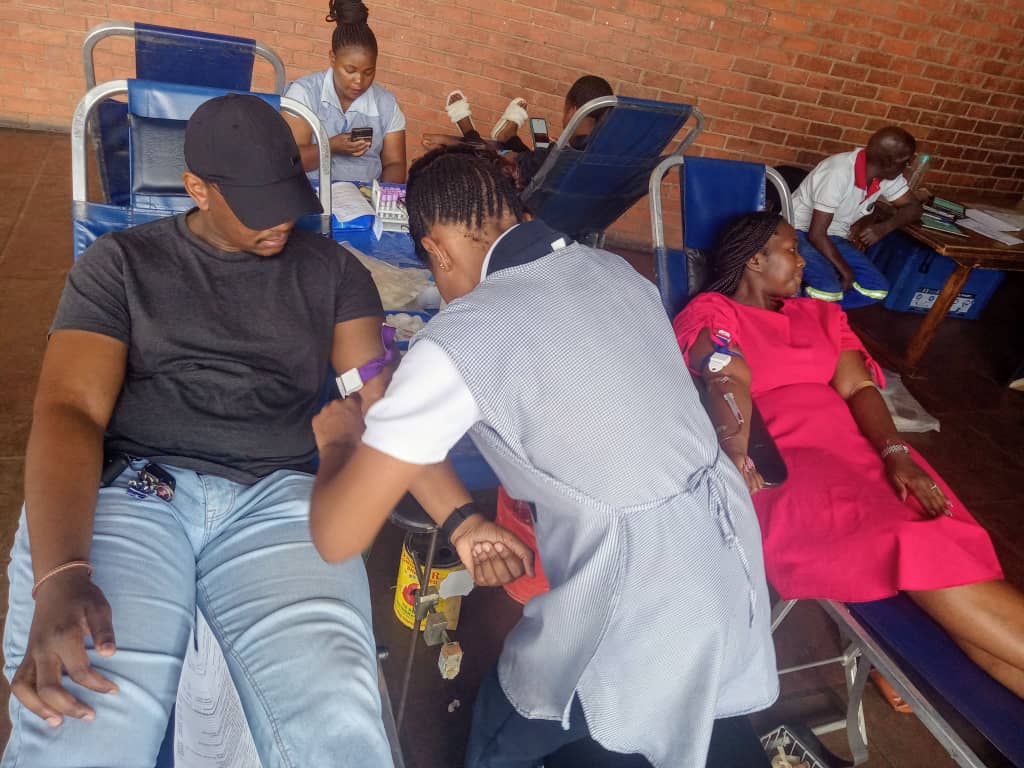|
Getting your Trinity Audio player ready…
|
Writes Marlvin Ngiza
The National Blood Services Zimbabwe in partnership with the Shincheonji Volunteers, Youth Vibes Afrika, and The City of Harare successfully hosted a blood drive initiative in Warren Park 1, Harare, on Saturday at a community outreach held at Magamba Hall.
The partnership which was meant to mobilise people from the church, young people, and other members of the society towards donating blood has registered a success that has been attested by a positive turnout of all age groups.
The NBSZ Blood Donor Coordinators Team Leader, Tichaona Saira, revealed that the mobile outreaches were meant to reach more blood donors in communities to ensure sufficiency in national blood reservoirs.
He further said that the public health institutions needed to have enough blood to ensure that those who will need it will immediately get it while encouraging members of the public to donate blood to save lives.
“We are excited to be here in Warren Park today where we are meeting blood donors. We are targeting to collect 40 units and above of blood today and we are happy that people are coming to donate blood. We partnered with the church and youth organization because we know that they work in the community. They know the community better and they have a good reception as well.
“We are descending into communities so that we give everyone a chance to donate blood because some may not have transport money to come to our offices for donations. We have the free blood initiative which was launched in 2018 by the government in all our government and council health institutions, which means every citizen has the privilege to be a beneficiary, so we are collecting blood so that we can satisfy every citizen who is need of blood,” said Saira.
The Shicheonji Volunteers (SCJ) Ministry of Services and Transport representative, Neil Maretekwa, encouraged the church to partner with national health bodies and to actively participate in health-related programmes such as blood donations by vigorously spearheading educational campaigns and encouraging their members to donate blood.
“It is not only about preaching the word of God but the church can also participate in some programmes that are meant to save lives, both spiritually and physically. I am urging all churches and believers not to hesitate to partner and donate blood through such initiatives.
“I also want to clarify that there are no rituals attached to blood donations as other reports say but everything that is done here in Zimbabwe by these official institutions is safe for the citizenry. Let us not be corrupted by falsehoods. Let us save lives as a church by encouraging our members to donate blood,” said Maretekwa.
The Youth Vybes Afrika Founder and Chief Executive Officer, Ruvarashe Miti, challenged youth to be the most active group in donating blood in the country saying that has been the best way of saving lives as young people instead of wasting time and money on drugs.
“As young people of Zimbabwe, we should be the champions of saving lives. We know that accidents are causing many injuries in the country and this means that the demand for blood increases. When we donate blood as young people in our numbers, it means that our national blood reserves will have adequate blood hence the cost of buying blood will fall,” she said
Meanwhile sharing expressions after donating blood, Brave said: “Donating blood is very easy and this is my first time to donate. I decided to donate because I know that there is life in sharing and most importantly, blood is life. I want to encourage others to share love by donating blood and I am sure that you will be happy to hear that you have saved two or three lives,” said Brave.
Blood demand increases especially during holidays such as Christmas, New Year, Easter, and Heroes Day when many accidents are reported.
Mothers also lose much of their blood while giving birth and the NBSZ has been spearheading the blood drive in March which has been the women’s month. There are efforts to address challenges faced by mothers giving birth and women battling cancer and any other chronic diseases that require blood transfusion.
